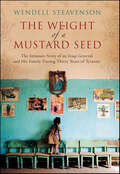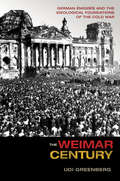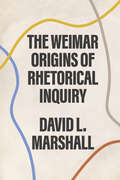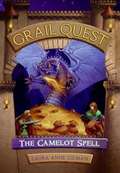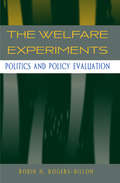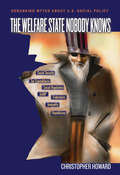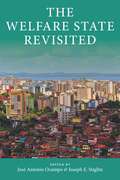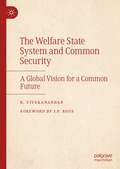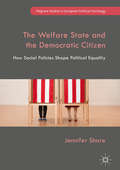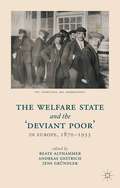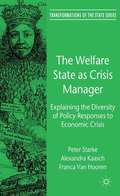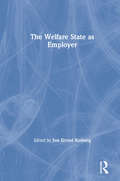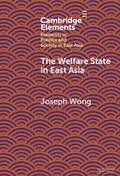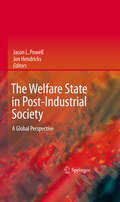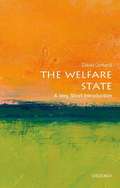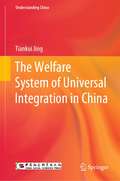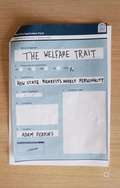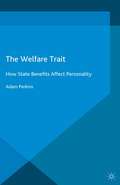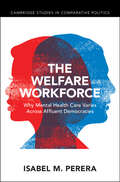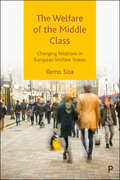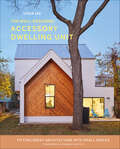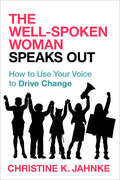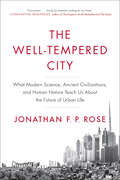- Table View
- List View
The Weight of a Mustard Seed: The Intimate Story of an Iraqi General and His Family During Thirty Years of Tyranny
by Wendell Steavenson“A masterly and elegantly told story that weaves together the Iraqi past and present.” —New York Times Book Review“A first-class investigation…that tells the reader more about the tensions of living close to power in Saddam’s dictatorship.”—Washington PostThe Weight of a Mustard Seed is an unprecedented and intimate account of Iraqi life under Saddam Hussein’s brutal regime, revealed through the tragic story of one of the dictator’s loyal generals. Journalist Wendell Steavenson writes thrilling nonfiction with a novelist’s flair, offering a new perspective on life inside a totalitarian regime that is as moving, compelling, and dramatic as The Kite Runner and The Bookseller of Kabul.
The Weimar Century
by Udi GreenbergThe Weimar Century reveals the origins of two dramatic events: Germany's post-World War II transformation from a racist dictatorship to a liberal democracy, and the ideological genesis of the Cold War. Blending intellectual, political, and international histories, Udi Greenberg shows that the foundations of Germany's reconstruction lay in the country's first democratic experiment, the Weimar Republic (1918-33). He traces the paths of five crucial German émigrés who participated in Weimar's intense political debates, spent the Nazi era in the United States, and then rebuilt Europe after a devastating war. Examining the unexpected stories of these diverse individuals--Protestant political thinker Carl J. Friedrich, Socialist theorist Ernst Fraenkel, Catholic publicist Waldemar Gurian, liberal lawyer Karl Loewenstein, and international relations theorist Hans Morgenthau--Greenberg uncovers the intellectual and political forces that forged Germany's democracy after dictatorship, war, and occupation. In restructuring German thought and politics, these émigrés also shaped the currents of the early Cold War. Having borne witness to Weimar's political clashes and violent upheavals, they called on democratic regimes to permanently mobilize their citizens and resources in global struggle against their Communist enemies. In the process, they gained entry to the highest levels of American power, serving as top-level advisors to American occupation authorities in Germany and Korea, consultants for the State Department in Latin America, and leaders in universities and philanthropic foundations across Europe and the United States. Their ideas became integral to American global hegemony.From interwar Germany to the dawn of the American century, The Weimar Century sheds light on the crucial ideas, individuals, and politics that made the trans-Atlantic postwar order.
The Weimar Origins of Rhetorical Inquiry
by David L. MarshallThe Weimar origins of political theory is a widespread and powerful narrative, but this singular focus leaves out another intellectual history that historian David L. Marshall works to reveal: the Weimar origins of rhetorical inquiry. Marshall focuses his attention on Martin Heidegger, Hannah Arendt, Walter Benjamin, and Aby Warburg, revealing how these influential thinkers inflected and transformed problems originally set out by Max Weber, Carl Schmitt, Theodor Adorno, Hans Baron, and Leo Strauss. He contends that we miss major opportunities if we do not attend to the rhetorical aspects of their thought, and his aim, in the end, is to lay out an intellectual history that can become a zone of theoretical experimentation in para-democratic times. Redescribing the Weimar origins of political theory in terms of rhetorical inquiry, Marshall provides fresh readings of pivotal thinkers and argues that the vision of rhetorical inquiry that they open up allows for new ways of imagining political communities today.
The Weirdstone of Brisingamen
by Alan GarnerThe Weirdstone of Brisingamen is a 220 page fantasy novel written by the widely acclaimed author Alan Garner and first published in 1960. The Moon of Gomrath is its sequel. Alan Garner belongs to the distinguished line of children's fantasy writers that includes E Nesbit, J. R. R. Tolkien, C. S. Lewis, Lloyd Alexander, and Susan Cooper. The summary by William Collins Publishers reads as follows: In Fundindelve, the great dwarf-hall, legend says that a band of knights lie deep in enchanted slumber. They will not wake until the day when they must fight Nastrond, the spirit of evil. The magic which binds the sleeping knights is sealed in the heart of the Weirdstone of Brisingamen, and guarded by the good wizard Cadellin. When Susan and Colin, curious about this legend, venture into the gloomy woods near Alderley Edge, they are suddenly attacked and captured by the svart-alfar, strange goblin-like creatures, and then, in a flash of blue light, rescued by Cadellin. However, the good wizard has disturbing news: he has lost the Weirdstone!And if Nastrond finds it before Cadellin does, the world is doomed. But why did Nastrond send the svart-alfar to capture Susan and Colin? How are these modern-day children involved with the ancient magic? Not until they are safely home again does Susan realize that the jewel she wears on her wrist-the one her mother gave her long ago-is the missing Weirdstone. Trying to bring it back to Cadellin, she and Colin are soon caught up in a terrifying struggle between the forces of good and evil for possession of the stone. Alan Garner, winner of the Carnegie Medal and many other awards for his distinguished fiction for young readers, here draws on his deep knowledge of ancient folklore to create a world of sorcery, fantasy, and high adventure.
The Welfare Experiments
by Robin Rogers-DillonWelfare experiments conducted at the state level during the 1990s radically restructured the American welfare state and have played a critical--and unexpected--role in the broader policymaking process. Through these experiments, previously unpopular reform ideas, such as welfare time limits, gained wide and enthusiastic support. Ultimately, the institutional legacy of the old welfare system was broken, new ideas took hold, and the welfare experiments generated a new institutional channel in policymaking. In this book, Rogers-Dillon argues that these welfare experiments were not simply scientific experiments, as their supporters frequently contend, but a powerful political tool that created a framework within which few could argue successfully against the welfare policy changes. Legislation proposed in 2002 formalized this channel of policymaking, permitting the executive, as opposed to legislative, branches of federal and state governments to renegotiate social policies--an unprecedented change in American policymaking. This book provides unique insight into how social policy is made in the United States, and how that process is changing.
The Welfare Experiments: Politics and Policy Evaluation
by Robin H. Rogers-DillonWelfare experiments conducted at the state level during the 1990s radically restructured the American welfare state and have played a critical—and unexpected—role in the broader policymaking process. Through these experiments, previously unpopular reform ideas, such as welfare time limits, gained wide and enthusiastic support. Ultimately, the institutional legacy of the old welfare system was broken, new ideas took hold, and the welfare experiments generated a new institutional channel in policymaking. In this book, Rogers-Dillon argues that these welfare experiments were not simply scientific experiments, as their supporters frequently contend, but a powerful political tool that created a framework within which few could argue successfully against the welfare policy changes. Legislation proposed in 2002 formalized this channel of policymaking, permitting the executive, as opposed to legislative, branches of federal and state governments to renegotiate social policies—an unprecedented change in American policymaking. This book provides unique insight into how social policy is made in the United States, and how that process is changing.
The Welfare State Nobody Knows: Debunking Myths About U.S. Social Policy
by Christopher HowardThe Welfare State Nobody Knows challenges a number of myths and half-truths about U. S. social policy. The American welfare state is supposed to be a pale imitation of "true" welfare states in Europe and Canada. Christopher Howard argues that the American welfare state is in fact larger, more popular, and more dynamic than commonly believed. Nevertheless, poverty and inequality remain high, and this book helps explain why so much effort accomplishes so little. One important reason is that the United States is adept at creating social programs that benefit the middle and upper-middle classes, but less successful in creating programs for those who need the most help. This book is unusually broad in scope, analyzing the politics of social programs that are well known (such as Social Security and welfare) and less well known but still important (such as workers' compensation, home mortgage interest deduction, and the Americans with Disabilities Act). Although it emphasizes developments in recent decades, the book ranges across the entire twentieth century to identify patterns of policymaking. Methodologically, it weaves together quantitative and qualitative approaches in order to answer fundamental questions about the politics of U. S. social policy. Ambitious and timely, The Welfare State Nobody Knows asks us to rethink the influence of political parties, interest groups, public opinion, federalism, policy design, and race on the American welfare state.
The Welfare State Nobody Knows: Debunking Myths about U.S. Social Policy
by Christopher HowardThe Welfare State Nobody Knows challenges a number of myths and half-truths about U.S. social policy. The American welfare state is supposed to be a pale imitation of "true" welfare states in Europe and Canada. Christopher Howard argues that the American welfare state is in fact larger, more popular, and more dynamic than commonly believed. Nevertheless, poverty and inequality remain high, and this book helps explain why so much effort accomplishes so little. One important reason is that the United States is adept at creating social programs that benefit the middle and upper-middle classes, but less successful in creating programs for those who need the most help. This book is unusually broad in scope, analyzing the politics of social programs that are well known (such as Social Security and welfare) and less well known but still important (such as workers' compensation, home mortgage interest deduction, and the Americans with Disabilities Act). Although it emphasizes developments in recent decades, the book ranges across the entire twentieth century to identify patterns of policymaking. Methodologically, it weaves together quantitative and qualitative approaches in order to answer fundamental questions about the politics of U.S. social policy. Ambitious and timely, The Welfare State Nobody Knows asks us to rethink the influence of political parties, interest groups, public opinion, federalism, policy design, and race on the American welfare state.
The Welfare State Revisited (Initiative for Policy Dialogue at Columbia: Challenges in Development and Globalization)
by Joseph E. Stiglitz José Antonio OcampoThe welfare state has been under attack for decades, but now more than ever there is a need for strong social protection systems—the best tools we have to combat inequality, support social justice, and even improve economic performance. In this book, José Antonio Ocampo and Joseph E. Stiglitz bring together distinguished contributors to examine the global variations of social programs and make the case for a redesigned twenty-first-century welfare state.The Welfare State Revisited takes on major debates about social well-being, considering the merits of universal versus targeted policies; responses to market failures; integrating welfare and economic development; and how welfare states around the world have changed since the neoliberal turn. Contributors offer prescriptions for how to respond to the demands generated by demographic changes, the changing role of the family, new features of labor markets, the challenges of aging societies, and technological change. They consider how strengthening or weakening social protection programs affects inequality, suggesting ways to facilitate the spread of effective welfare states throughout the world, especially in developing countries. Presenting new insights into the functions the welfare state can fulfill and how to design a more efficient and more equitable system, The Welfare State Revisited is essential reading on the most discussed issues in social welfare today.
The Welfare State System and Common Security: A Global Vision for a Common Future
by B. VivekanandanThis book argues that the welfare state system should be adopted globally, not only for the purpose of achieving equality and justice within nations, but also for security between states. Using Finland, Sweden and Canada as case studies, it theorises that the welfare state system and the common security system, which are mutually reinforcing peace structures, should be utilised worldwide as the best method of attaining peace and prosperity. It demonstrates the feasibility of the welfare state in the past, whilst also showing how these historical experiences can be translated into socio-political action to address contemporary global challenges. Operating in the fields of political theory, international relations, and social philosophy, it will appeal to scholars and students of public policy, the welfare state, and sociology, as well as state policymakers.
The Welfare State and the Democratic Citizen: How Social Policies Shape Political Equality (Palgrave Studies in European Political Sociology)
by Jennifer ShoreThis book examines the ways in which the welfare state impacts levels and distributions of political participation and democratic support in Western democracies. Going beyond the traditional contextual accounts of political behaviour, which primarily focus on political institutions or the socio-economic climate, this book looks specifically at the impact of public policy on a variety of political behaviours and attitudes. Drawing on the theoretical insights from the policy feedback approach, the author argues and empirically demonstrates that generous social policy offerings can not only foster democratic citizenship by promoting a more inclusive political culture, but are most beneficial to citizens who are otherwise excluded from political life in many other societies. This book will appeal most to scholars in the fields of political science and sociology who are especially interested in the welfare state, public policy, political sociology, and inequality.
The Welfare State and the ‘Deviant Poor’ in Europe, 1870–1933
by Beate Althammer Andreas Gestrich Jens GründlerThe strife for social improvement that arose in the decades around the turn of the 20th century raised the issue of social conformity in new ways: how were citizens who did not adhere to the rules to be dealt with? This edited collection opens new perspectives on the history of the emerging welfare state by focusing on its margins.
The Welfare State as Crisis Manager
by Alexandra Kaasch Peter Starke Franca Van HoorenThis book presents an in-depth analysis of social policy reactions to international economic shocks in four different welfare states, over a 40-year period. It reveals how expansion and retrenchment are shaped by domestic politics and existing welfare state institutions.
The Welfare State as Employer
by Jon Eivind KolbergAn analysis of the Scandinavian model of the welfare state, based on a research program initiated by the Nordic Council in 1985. From an examination of the specific configurations of labor markets and welfare in Scandinavia, it concludes that the welfare state has become the main vehicle of industri
The Welfare State in East Asia (Elements in Politics and Society in East Asia)
by Joseph WongDuring the postwar period, Japan, Taiwan and South Korea emerged as industrial and democratic exemplars in the East Asia region. A less well-known story is of their equally remarkable achievements in social policy reform and the formation of welfare states. Section 1 of the Element provides an overview of welfare state deepening in Japan, Taiwan and Korea and an account of why and how the developmental states institutionalized the social insurance model. Section 2 examines the drivers of social welfare universalization in Japan, Taiwan and Korea, notably the importance of democratization. Section 3 focuses on emerging challenges to the East Asian welfare state and how it has adapted. Though Japan, South Korea and Taiwan evolved their welfare states in a distinctive way historically, the current challenges they face and their responses have converged with other developed, post-industrial democracies.
The Welfare State in Post-Industrial Society
by Jon Hendricks Jason L. PowellIn recent years, major social forces such as: ageing populations, social trends, migration patterns, and the globalization of economies, have reshaped social welfare policies and practices across the globe. Multinational corporations, NGOs, and other international organizations have begun to influence social policy at a national and local level. Among the many ramifications of these changes is that globalizing influences may hinder the ability of individual nation-states to effect policies that are beneficial to them on a local level. With contributions from thirteen countries worldwide, this collected work represents the first major comparative analysis on the effect of globalization on the international welfare state. The Welfare State in Post-Industrial Society is divided into two major sections: the first draws from a number of leading social welfare researchers from diverse countries who point to the nation-state as case studies; highlighting how it goes about establishing and revising social welfare provisions. The second portion of the volume then moves to a more global perspective in its analysis and questioning of the impact of globalization on citizenship, ageing and marketization. The Welfare State in Post-Industrial Society seeks to encourage debate about the implications of the most pressing social welfare issues in nation-states, and integrate analyses of policy and practice in particular countries struggling to provide social welfare support for their needy populations.
The Welfare State: A Very Short Introduction (Very Short Introductions)
by David Garland<p>Welfare states vary across nations and change over time. And the balance between markets and government; free enterprise and social protection is perennially in question. But all developed societies have welfare states of one kind or another - they are a fundamental dimension of modern government. And even after decades of free-market criticism and reform, their core institutions have proven resilient and popular. <p>This Very Short Introduction describes the modern welfare state, explaining its historical and contemporary significance and arguing that far from being 'a failure' or 'a problem', welfare states are an essential element of contemporary capitalism, and a vital concomitant of democratic government. In this accessible and entertaining account, David Garland cuts through the fog of misunderstandings to explain in clear and simple terms, what welfare states are, how they work, and why they matter.</p>
The Welfare System of Universal Integration in China (Understanding China)
by Tiankui JingThis book presents the concepts: the welfare system of universal integration and the welfare mode of universal integration. In this book, the author explores the foundation of fair baseline about the universal integration on the basis of critically inheriting the domestic and international social welfare theories, comprehensively explains the connotation, subject and application of fair baseline theory. It systematically discusses the theoretical basis, basic features, scientific evidence, system composition and operating mechanism, introduces the experience in the west and Asia about the construction of social welfare system, further investigates and understands the public needs about the social welfare, talks about the system design of the welfare system of universal integration and provides some realistic, individualized and operative suggestions for promoting the welfare system of universal integration.
The Welfare Trait: How State Benefits Affect Personality
by Adam PerkinsThe welfare state has a problem: each generation living under its protection has lower work motivation than the previous one. In order to fix this problem we need to understand its causes, lest the welfare state ends up undermining its own economic and social foundations. In The Welfare Trait, award-winning personality researcher Dr Adam Perkins argues that welfare-induced personality mis-development is a significant part of the problem. In support of his theory, Dr Perkins presents data showing that the welfare state can boost the number of children born into disadvantaged households, and that childhood disadvantage promotes the development of an employment-resistant personality profile, characterised by aggressive, antisocial and rule-breaking tendencies. The book concludes by recommending that policy should be altered so that the welfare state no longer increases the number of children born into disadvantaged households. It suggests that, without this change, the welfare state will erode the nation's work ethic by increasing the proportion of individuals in the population who possess an employment-resistant personality profile, due to exposure to the environmental influence of disadvantage in childhood.
The Welfare Trait: How State Benefits Affect Personality
by Adam PerkinsThe welfare state has a problem: each generation living under its protection has lower work motivation than the previous one. In order to fix this problem we need to understand its causes, lest the welfare state ends up undermining its own economic and social foundations. In The Welfare Trait, award-winning personality researcher Dr Adam Perkins argues that welfare-induced personality mis-development is a significant part of the problem. In support of his theory, Dr Perkins presents data showing that the welfare state can boost the number of children born into disadvantaged households, and that childhood disadvantage promotes the development of an employment-resistant personality profile, characterised by aggressive, antisocial and rule-breaking tendencies. The book concludes by recommending that policy should be altered so that the welfare state no longer increases the number of children born into disadvantaged households. It suggests that, without this change, the welfare state will erode the nation's work ethic by increasing the proportion of individuals in the population who possess an employment-resistant personality profile, due to exposure to the environmental influence of disadvantage in childhood.
The Welfare Workforce: Why Mental Health Care Varies Across Affluent Democracies (Cambridge Studies in Comparative Politics)
by Isabel M. PereraThe Welfare Workforce is a thought-provoking exploration of mental health care in the United States and beyond. Although all the affluent democracies pursued deinstitutionalization, some failed to provide adequate services, while others overcame challenges of stigma and limited resources and successfully expanded care. Isabel M. Perera examines the role of the “welfare workforce” in providing social services to those who cannot demand them. Drawing on extensive research in four countries – the United States, France, Norway, and Sweden – Perera sheds light on post-industrial politics and the critical part played by those who work for the welfare state. A must-read for anyone interested in mental health care, social services, and the politics of welfare, The Welfare Workforce challenges conventional wisdom and offers new insights into the complex factors that contribute to the success or failure of mental health care systems. This title is also available as Open Access on Cambridge Core.
The Welfare of the Middle Class: Changing Relations in European Welfare States
by Remo SizaIn many European countries, processes of individualisation have contributed to transforming the middle class into a multitude of people, a sort of ‘middle mass’ with an unstable social identity and radical activism. The different ‘worlds’ of European welfare states seem progressively less able to manage this new kind of middle-class activism. This book is an essential contribution to ongoing public and academic debates on the unpredictability of middle-class attitudes and on their changing relations with the welfare state. Identifying key trends in the literature, it considers the impact of recent welfare reforms on the needs and preferences of the middle class.
The Well-Designed Accessory Dwelling Unit: Fitting Great Architecture into Small Spaces
by Lydia LeeAn inspirational look book for conceiving, planning, and building an accessory dwelling unit (ADU), a small house that is on the same property as the main house—a quickly growing trend that is transforming our vision of what a dream home should be. ADUs offer homeowners opportunities to host family and friends, add studio or office space, or generate passive income through a long-term rental on their existing property. Combine these practical benefits with broad and preferential rezoning in many municipalities throughout the US, and ADUs are one of the biggest developments in housing. Written by award-winning architecture and design writer Lydia Lee, this thoughtful exploration of ADUs answers many of the questions that arise when thinking about investing in an ADU. From design strategies and challenges to understanding zoning regulations to financing and material selection, this title covers the need-to-know basics on ADUs in addition to presenting expert advice from architects, builders, and homeowners. Accompanying this information are extensive looks at 15 carefully designed ADUs from the US and Canada, complete with showstopping photos, floor plans, and informative text boxes. Readers will learn unique perspectives from each project including green building solutions, practical architectural solutions to optimize limited space, and the pitfalls homeowners encountered and resolved. Content includes • insights shared by architects and ADU owners from 15 projects in the US and Canada; • floor plans and high-end interior and exterior project photography; • discussion of prefabricated materials, green building, and storage solutions; and • a primer on zoning, financing, building, and more. With so many possibilities and opportunities for ADUs, this book is ideal for homeowners, architects, interior designers, builders, and developers.
The Well-Spoken Woman Speaks Out: How to Use Your Voice to Drive Change
by Christine K. JahnkePractical and inspiring, this book is a valuable asset for women seeking to drive change with #MeToo, March for our Lives, Time's Up, Black Women Lead, Climate Action, She Should Run, Power to the Polls, and women's marches.In her successful book The Well-Spoken Woman, top speech coach Christine K. Jahnke shared techniques to help women present their ideas effectively in any setting. This new follow-up is for women who are persisting, resisting, advocating, or running for office--and gives them the tools to be effective, persuasive, and powerful communicators. The Well-Spoken Woman Speaks Out will guide any woman who wants to state her case in the most compelling way, ensure that she is truly heard and understood, and seeks to impact and inspire others. It takes Jahnke's direct experience working with women like Michelle Obama and the presidential campaign of Hillary Clinton and pairs it with the recent surge of women nationwide who are speaking up to drive social and political change. Jahnke, who has spent twenty-five years helping women leaders, provides guidance and best practices so you can: rally support for a cause, make a persuasive pitch, campaign for public office, be a successful advocate, and motivate people to make positive change. She applies her expertise to many facets of communicating publicly, including using your voice in social media; participating in panels, meetings, and discussions; giving presentations; and speaking to the media.
The Well-Tempered City: What Modern Science, Ancient Civilizations, and Human Nature Teach Us About the Future of Urban Life
by Jonathan F. Rose“A thorough education in how to move from simply maximizing the economic output of cities to improving the well-being of all urban residents.” —Daniel L. Doctoroff, CEO, Sidewalk Labs2017 PROSE Award Winner: Outstanding Scholarly Work by a Trade Publisher Cities are birthplaces of civilization; centers of culture, trade, and progress; cauldrons of opportunity—and the home of eighty percent of the world’s population by 2050. As the twenty-first century progresses, metropolitan areas will bear the brunt of global megatrends such as climate change, natural resource depletion, population growth, income inequality, mass migrations, education and health disparities, among many others. In The Well-Tempered City, Jonathan F. P. Rose—the man who “repairs the fabric of cities”—distills a lifetime of interdisciplinary research and firsthand experience into a five-pronged model for how to design and reshape our cities with the goal of equalizing their landscape of opportunity. Drawing from the musical concept of “temperament” as a way to achieve harmony, Rose argues that well-tempered cities can be infused with systems that bend the arc of their development toward equality, resilience, adaptability, well-being, and the ever-unfolding harmony between civilization and nature. These goals may never be fully achieved, but our cities will be richer and happier if we aspire to them, and if we infuse our every plan and constructive step with this intention. A celebration of the city and an impassioned argument for its role in addressing the important issues in these volatile times, The Well-Tempered City is a reasoned, hopeful blueprint for a thriving metropolis—and the future.“A thought-provoking introduction to the future of cities.” —Publishers Weekly
